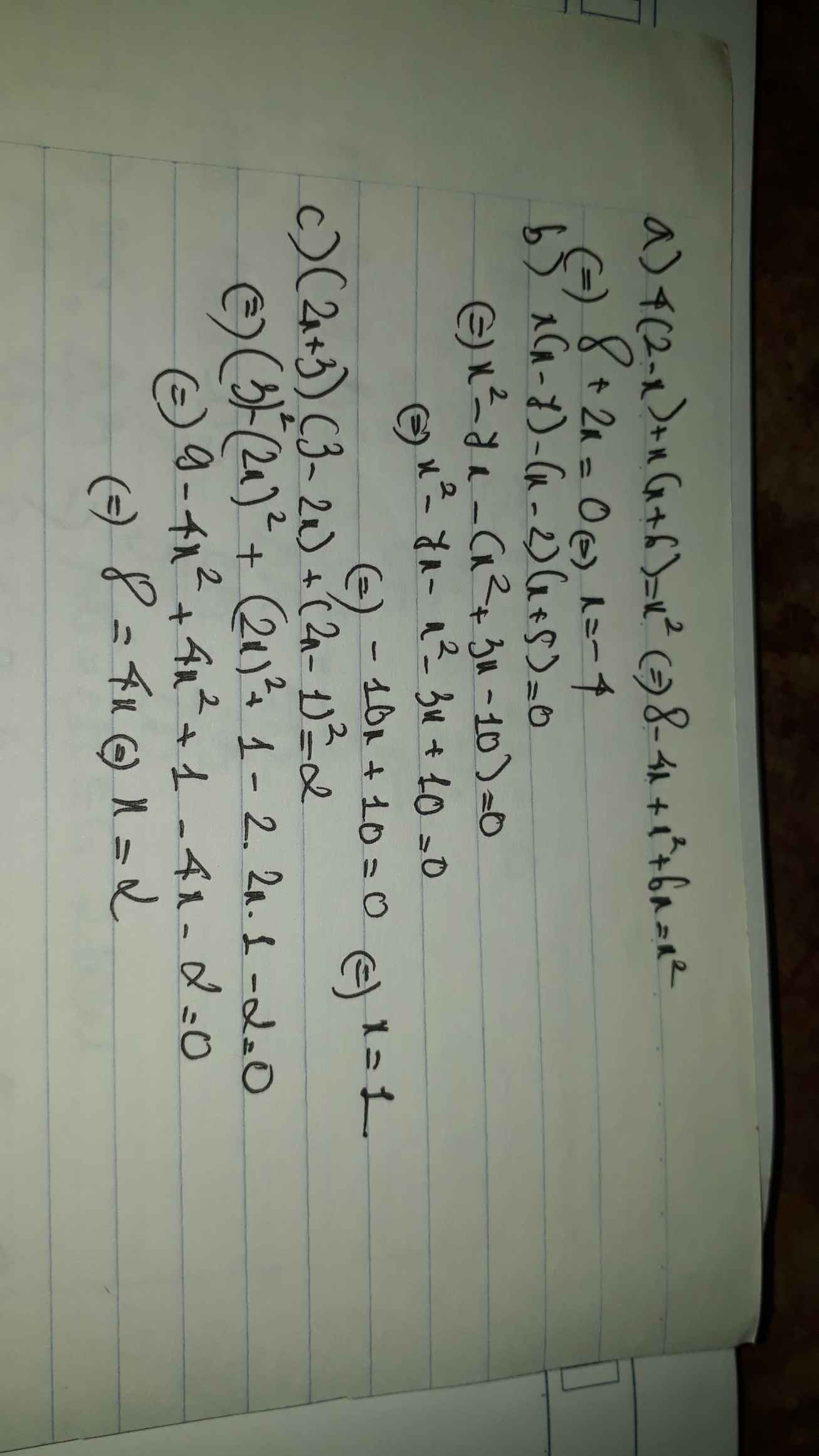|2x+6|+ |x+2| + |2x+2| =4 tìm x

Những câu hỏi liên quan
Tìm x biết : a) (x+2)(x²-2x+4)-x(x²-2)=15 b) (x-4)² - (x-2)(x+2)= 6 c) x⁴-2x³+x²-2x=0
a) \(\left(x+2\right)\left(x^2-2x+4\right)-x\left(x^2-2\right)=15\)
\(\Leftrightarrow\left(x^3+2^3\right)-\left(x^3-2x\right)=15\)
\(\Leftrightarrow x^3+8-x^3+2x=15\)
\(\Leftrightarrow2x+8=15\)
\(\Leftrightarrow2x=15-8\)
\(\Leftrightarrow2x=7\)
\(\Leftrightarrow x=\dfrac{7}{2}\)
b) \(\left(x-4\right)^2-\left(x+2\right)\left(x-2\right)=6\)
\(\Leftrightarrow x^2-8x+16-\left(x^2-4\right)=6\)
\(\Leftrightarrow x^2-8x+16-x^2+4=6\)
\(\Leftrightarrow-8x+20=6\)
\(\Leftrightarrow-8x=6-20\)
\(\Leftrightarrow-8x=-14\)
\(\Leftrightarrow x=\dfrac{7}{4}\)
c) \(x^4-2x^3+x^2-2x=0\)
\(\Leftrightarrow x^3\left(x-2\right)+x\left(x-2\right)=0\)
\(\Leftrightarrow\left(x^3+x\right)\left(x-2\right)=0\)
\(\Leftrightarrow x\left(x^2+1\right)\left(x-2\right)=0\)
\(\Leftrightarrow\left[{}\begin{matrix}x=0\\x=2\end{matrix}\right.\)
Đúng 2
Bình luận (0)
`(x+2)(x^2 -2x+4) -x(x^2-2)=15`
`<=> x^3 +8 - x^3 + 2x-15=0`
`<=> 2x-7=0`
`<=> 2x=7`
`<=>x=7/2`
__
`(x-4)^2 -(x-2)(x+2)=6`
`<=>x^2 - 8x+16- x^2 +4-6=0`
`<=> -8x+14=0`
`<=> -8x=-14`
`<=>x=14/8= 7/4`
__
`x^4 -2x^3 +x^2-2x=0`
`<=>x(x^3-2x^2+x-2)=0`
`<=> x(x^3+x-2x^2-2)=0`
`<=>x(x(x^2+1) -2(x^2+1))=0`
`<=> x(x^2+1)(x-2)=0`
\(\Leftrightarrow\left[{}\begin{matrix}x=0\\x^2+1=0\\x-2=0\end{matrix}\right.\\ \Leftrightarrow\left[{}\begin{matrix}x=0\\x=2\end{matrix}\right.\)
Đúng 3
Bình luận (1)
1/x^2-2x+2+2/x^2-2x+3=6/x^2-2x+4
tìm x
|2x+6|+ |x+2| + |2x+2| =4 tìm x
|2x+6|+|x+2|+|2x+2|=4
=>2|x+3|+|x+2|+2|x+1|=4(1)
TH1: x<-3
(1) sẽ trở thành:
2(-x-3)+(-x-2)+2(-x-1)=4
=>-2x-6-x-2-2x-2=4
=>-5x-10=4
=>-5x=14
=>x=-14/5(loại)
TH2: -3<=x<-2
Phương trình (1) sẽ là:
2(x+3)+(-x-2)-2x-2=4
=>2x+6-x-2-2x-2=4
=>-x+2=4
=>-x=2
=>x=-2(loại)
TH3: -2<=x<-1
Phương trình (1) sẽ là:
2x+6+x+2-2x-2=4
=>x+6=4
=>x=-2(nhận)
Th4: x>=-1
Phương trình (1) sẽ trở thành:
2x+6+x+2+2x+2=4
=>5x+10=4
=>5x=-6
=>x=-6/5(loại)
Đúng 0
Bình luận (0)
bài 7 tìm x1,x(x+3)-5(x+3)0 2,5x(x-1)x-13,(x+1)(x+1)^2 4,x(2x-3)-2(3-2x)05,left(x-2right)^2-40 6,36x^2497,2xleft(x-6right)-x+60 8,3xleft(2x-1right)-24x+1209,x^2-6x+80 10,x^2+2x-150
Đọc tiếp
bài 7 tìm x
1,x(x+3)-5(x+3)=0 2,5x(x-1)=x-1
3,(x+1)=(x+1)\(^2\) 4,x(2x-3)-2(3-2x)=0
5,\(\left(x-2\right)^2-4=0\) 6,\(36x^2=49\)
7,\(2x\left(x-6\right)-x+6=0\) 8,\(3x\left(2x-1\right)-24x+12=0\)
9,\(x^2-6x+8=0\) 10,\(x^2+2x-15=0\)
1: =>(x+3)(x-5)=0
=>x=5 hoặc x=-3
2: =>(x-1)(5x-1)=0
=>x=1/5 hoặc x=1
5: =>(x-4)*x=0
=>x=0 hoặc x=4
10: =>(x+5)(x-3)=0
=>x=3 hoặc x=-5
9: =>(x-2)(x-4)=0
=>x=2 hoặc x=4
7: =>(x-6)(2x-1)=0
=>x=1/2 hoặc x=6
8: =>(2x-1)(3x-12)=0
=>x=4 hoặc x=1/2
Đúng 1
Bình luận (0)
Bài 4: Tìm x, biết:
a) 3(2x – 3) + 2(2 – x) = –3 ; b) x(5 – 2x) + 2x(x – 1) = 13 ;
c) 5x(x – 1) – (x + 2)(5x – 7) = 6 ; d) 3x(2x + 3) – (2x + 5)(3x – 2) = 8 ;
e) 2(5x – 8) – 3(4x – 5) = 4(3x – 4) + 11; f) 2x(6x – 2x 2 ) + 3x 2 (x – 4) = 8.
\(a,3\left(2x-3\right)+2\left(2-x\right)=-3\\ \Leftrightarrow6x-9+4-2x=-3\\ \Leftrightarrow4x=2\\ \Leftrightarrow x=\dfrac{1}{2}\\ b,x\left(5-2x\right)+2x\left(x-1\right)=13\\ \Leftrightarrow5x-2x^2+2x^2-2x=13\\ \Leftrightarrow3x=13\\ \Leftrightarrow x=\dfrac{13}{3}\\ c,5x\left(x-1\right)-\left(x+2\right)\left(5x-7\right)=6\\ \Leftrightarrow5x^2-5x-5x^2-3x+14=6\\ \Leftrightarrow-8x=-8\\ \Leftrightarrow x=1\\ d,3x\left(2x+3\right)-\left(2x+5\right)\left(3x-2\right)=8\\ \Leftrightarrow6x^2+9x-6x^2-11x+10=8\\ \Leftrightarrow-2x=-2\\ \Leftrightarrow x=1\)
\(e,2\left(5x-8\right)-3\left(4x-5\right)=4\left(3x-4\right)+11\\ \Leftrightarrow10x-16-12x+15=12x-16+11\\ \Leftrightarrow-14x=-4\\ \Leftrightarrow x=\dfrac{2}{7}\\ f,2x\left(6x-2x^2\right)+3x^2\left(x-4\right)=8\\ \Leftrightarrow12x^2-4x^3+3x^3-12x^2=8\\ \Leftrightarrow-x^3-8=0\\ \Leftrightarrow-\left(x^3+8\right)=0\\ \Leftrightarrow-\left(x+2\right)\left(x^2-2x+4\right)=0\\ \Leftrightarrow\left[{}\begin{matrix}x=-2\\x\in\varnothing\left(x^2-2x+4=\left(x-1\right)^2+3>0\right)\end{matrix}\right.\)
Đúng 3
Bình luận (0)
Bài 4:
a: Ta có: \(3\left(2x-3\right)-2\left(x-2\right)=-3\)
\(\Leftrightarrow6x-9-2x+4=-3\)
\(\Leftrightarrow4x=2\)
hay \(x=\dfrac{1}{2}\)
b: Ta có: \(x\left(5-2x\right)+2x\left(x-1\right)=13\)
\(\Leftrightarrow5x-2x^2+2x^2-2x=13\)
\(\Leftrightarrow3x=13\)
hay \(x=\dfrac{13}{3}\)
c: Ta có: \(5x\left(x-1\right)-\left(x+2\right)\left(5x-7\right)=6\)
\(\Leftrightarrow5x^2-5x-5x^2+7x-10x+14=6\)
\(\Leftrightarrow-8x=-8\)
hay x=1
Đúng 0
Bình luận (0)
a/ \(3\left(2x-3\right)+2\left(2-x\right)=-3\)
\(\Leftrightarrow6x-9+4-2x=-3\)
\(\Leftrightarrow4x=2\)
\(\Leftrightarrow x=\dfrac{1}{2}\)
Vậy: \(x=\dfrac{1}{2}\)
===========
b/ \(x\left(5-2x\right)+2x\left(x-1\right)=13\)
\(\Leftrightarrow5x-2x^2+2x^2-2x=13\)
\(\Leftrightarrow3x=13\)
\(\Leftrightarrow x=\dfrac{13}{3}\)
Vậy: \(x=\dfrac{13}{3}\)
==========
c/ \(5x\left(x-1\right)-\left(x+2\right)\left(5x-7\right)=6\)
\(\Leftrightarrow5x^2-5x-5x^2+7x-10x+14=6\)
\(\Leftrightarrow-8x=-8\)
\(\Leftrightarrow x=1\)
Vậy: \(x=1\)
==========
d/ \(3x\left(2x+3\right)-\left(2x+5\right)\left(3x-2\right)=8\)
\(\Leftrightarrow6x^2+9x-6x^2+4x-15x+10=8\)
\(\Leftrightarrow-2x=-2\)
\(\Leftrightarrow x=1\)
Vậy: \(x=1\)
==========
e/ \(2\left(5x-8\right)-3\left(4x-5\right)=4\left(3x-4\right)+11\)
\(\Leftrightarrow10x-16-12x+15=12x-16+11\)
\(\Leftrightarrow-14x=-4\)
\(\Leftrightarrow x=\dfrac{2}{7}\)
Vậy: \(x=\dfrac{2}{7}\)
==========
f/ \(2x\left(6x-2x^2\right)+3x^2\left(x-4\right)=8\)
\(\Leftrightarrow12x^2-4x^3+3x^3-12x^2=8\)
\(\Leftrightarrow-x^3=8\)
\(\Leftrightarrow x=-2\)
Vậy: \(x=-2\)
Đúng 0
Bình luận (0)
Tìm x:
a) 4.(2-x)+x.(x+6)=x2
b) x.(x-7)-(x-2).(x+5)=0
c) (2x+3).(3-2x)+(2x-1)2=2
a: Ta có: \(4\left(2-x\right)+x\left(x+6\right)=x^2\)
\(\Leftrightarrow8-4x+x^2+6x-x^2=0\)
\(\Leftrightarrow2x=-8\)
hay x=-4
b: Ta có: \(x\left(x-7\right)-\left(x-2\right)\left(x+5\right)=0\)
\(\Leftrightarrow x^2-7x-x^2-3x+10=0\)
\(\Leftrightarrow-10x=-10\)
hay x=1
c: Ta có: \(\left(2x+3\right)\left(3-2x\right)+\left(2x-1\right)^2=2\)
\(\Leftrightarrow9-4x^2+4x^2-4x+1=2\)
\(\Leftrightarrow-4x=-8\)
hay x=2
Đúng 1
Bình luận (0)
tìm x:
a)3(2x-3)+2(2-x)=-3
b)2x(x2-2)+x2(1-2x)-x2=-12
c)3x(2x+3)-(2x+5)(3x-2)=8
d)4x(x - 1) - 3(x2-5)-x2=(x-3)-(x+4)
e)2(3x-1)(2x+5)-6(2x-1)(x+2)=-6
a: Ta có: \(3\left(2x-3\right)+2\left(2-x\right)=-3\)
\(\Leftrightarrow6x-9+4-2x=-3\)
\(\Leftrightarrow4x=2\)
hay \(x=\dfrac{1}{2}\)
Đúng 2
Bình luận (1)
Tìm đkxđ của: 1, 3x/ 4x-8 2, 2x/ x²-9 3, 6/x³+1 4, 6x²/x²-2x+1 5, x-2/x²+3 6, 2x/x²+3+2
1) \(\dfrac{3x}{4x-8}\)
\(ĐKXĐ:4x-8\ne0\Leftrightarrow x\ne2\)
2) \(\dfrac{2x}{x^2-9}\)
\(ĐKXĐ:x^2-9\ne0\Leftrightarrow\)\(\left\{{}\begin{matrix}x\ne3\\x\ne-3\end{matrix}\right.\)
3) \(\dfrac{6}{x^3+1}=\dfrac{6}{\left(x+1\right)\left(x^2-x+1\right)}\)
\(ĐKXĐ:\)\(x+1\ne0\Leftrightarrow x\ne-1\)
(do \(x^2-x+1=\left(x-\dfrac{1}{2}\right)^2+\dfrac{3}{4}\ge\dfrac{3}{4}>0\))
4) \(\dfrac{6x^2}{x^2-2x+1}=\dfrac{6x^2}{\left(x-1\right)^2}\)
\(ĐKXĐ:x-1\ne0\Leftrightarrow x\ne1\)
5) \(\dfrac{x-2}{x^2+3}\)
Do \(x^2+3>0\forall x\in R\)
Vậy biểu thức trên xác định với mọi x
6) \(\dfrac{2x}{x^2+3x+2}=\dfrac{2x}{\left(x+1\right)\left(x+2\right)}\)
\(ĐKXĐ:\)\(\left\{{}\begin{matrix}x+1\ne0\\x+2\ne0\end{matrix}\right.\)\(\Leftrightarrow\left\{{}\begin{matrix}x\ne-1\\x\ne-2\end{matrix}\right.\)
Đúng 1
Bình luận (0)
Tìm x biết:
a; 3x.(2x+3)-(2x+5x).(3x-2)=8
b;4.(x-1)-3.(x^2-5)_x^2=(x-3)-(x+4)
c; 2.(3x-1).(2x+5)-6.(2x-1).(x+2)=-6
d; 3.(2x-1).(3x-1)-(2x-3.(9x-1)-3=3























